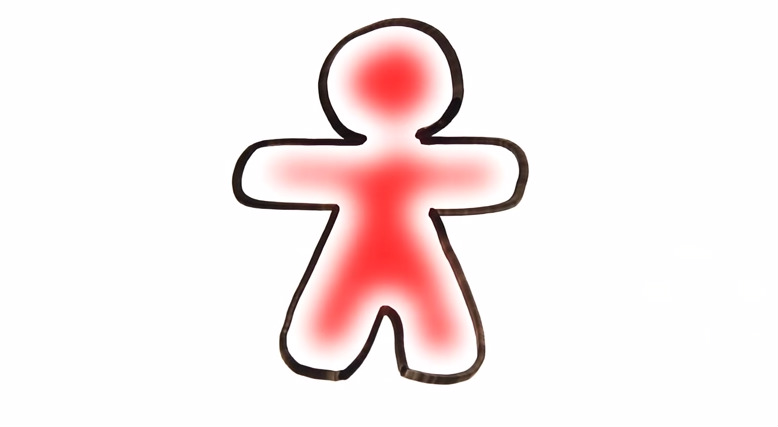My main goal with this lesson is to answer your question “What Happens if You Don’t Drink Enough Water Daily?” + to highlight and explain words you can use in your everyday conversations.
Transcript:
Every living organism we know of requires water to survive.
It’s part of the reason we look so feverishly for water on other planets across the universe, and consume it consistently every day here on Earth.
So what would happen to your body if you stopped drinking water?
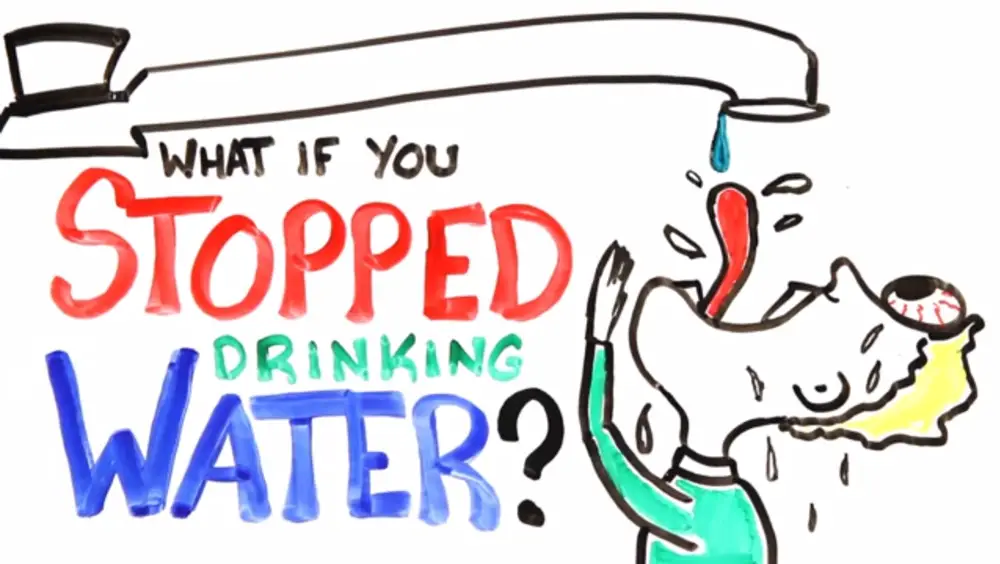
Of course, when we say ‘water’ we’re including all fluids which simply contain water – like juices, pop, or tea.
Much like the desire to breath in oxygen, thirst is a survival instinct. H20 is the most abundant molecule in the human body making up, on average, 65% of an adult. As a universal solvent, it carries nutrients and hormones through the body, regulates body temperature, cushions our joints and even lubricates our eyes.
You produce around 1.5 litres of urine every day, with another litre lost from breathing, sweating and…pooping.
So it’s essential that the body replaces this liquid.
The thirst centre of the brain is located in the hypothalamus, and is constantly using sensors in your blood vessels to monitor the amount of sodium and other substances in your body.
For example, if you sweat too much, your blood volume and pressure fall. The brain then detects this change and creates the urge to drink something, NOW!
So what happens if you are unable to satisfy this thirst?
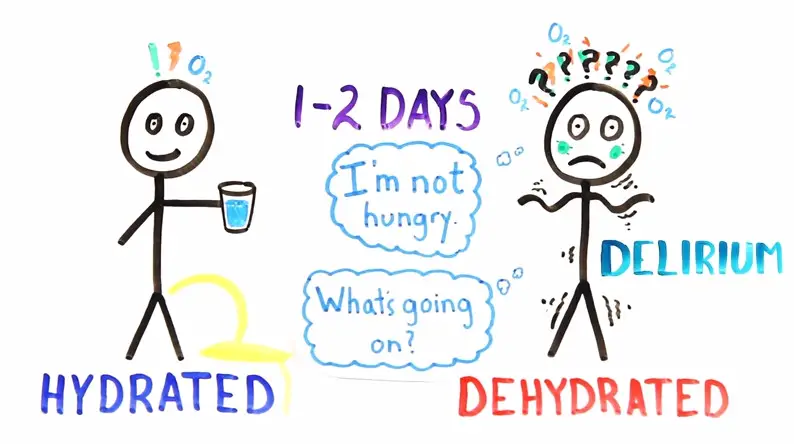
The initial signs of dehydration are the obvious dry mouth, following which, your urine becomes darker with a stronger odor, as your body attempts to conserve more fluids. The lack of H20 then begins to affect your brain – you may feel light-headed, have a slower response time and decreased ability to feel pain. In fact, when you’re dehydrated, your brain tissue literally shrinks.
In studies observing hydrated vs dehydrated participants, the same task required more brain power and oxygen in dehydrated individuals compared to those fully hydrated.
After a day or two with no fluids you’ll stop peeing all together, have trouble swallowing, suffer from muscle spasms and likely experience nausea – after all, your body can survive without food much longer, and attention to digestion is not a priority at this point.
Eventually, victims may become delirious with severely impaired brain function. Interestingly, studies looking at elderly patients who suffer from delirium, found that many are simply suffering from chronic dehydration in the first place. After even more time without water, the blood stops flowing to your skin, reducing heat loss but increasing your core body temperature. This can lead to a grey-blueish tinge to your skin.
Beyond 3-5 days without water, and your body will begin to shut down its organs, and eventually the brain.
Of course, unlike the plentiful oxygen we breathe, only 2.5% of all Earth’s water is fresh, most of which is locked up in glaciers, ice caps and underground lakes known as aquifers, leaving less than 1% available for drinking. And most of this water is actually used to grow crops, approximately 500 billion litres of fresh water is used daily for agriculture in the USA alone, with another 500 billion litres to cool electrical power plants.
And as our personal drinking sources become increasingly contaminated, over 783 million people on earth are unable to access clean water.
Scientists around the world are trying to find solutions to this problem – from attempts to remove salt from ocean water, tap into underground aquifers and creating innovative water filtration systems.
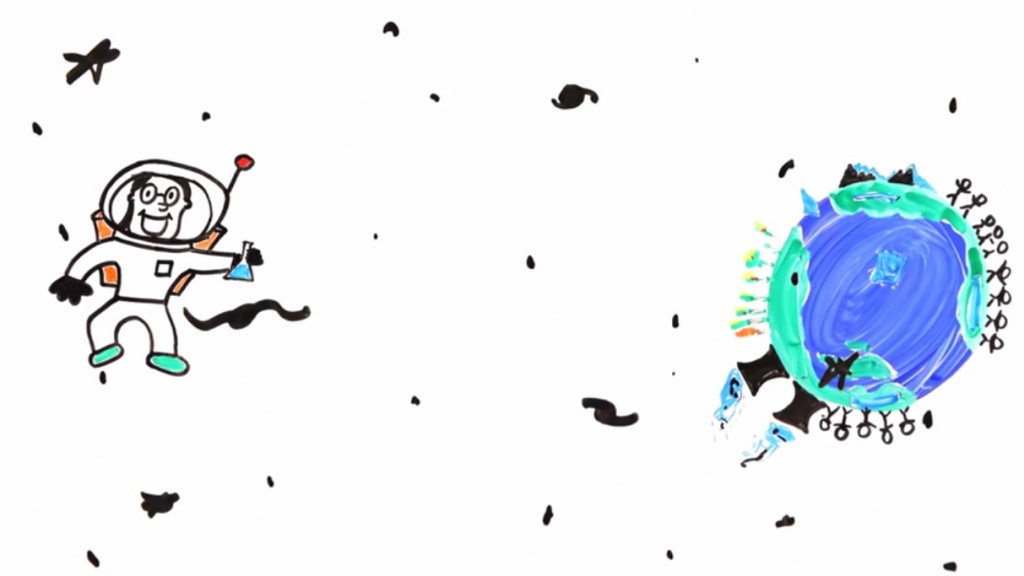
If we look to space, NASA has developed technology for astronauts to turn their urine into water more pure than what we drink on earth. But we can’t just rely on science and technology – perhaps the solution relies on us as a species to understand and contribute to this global water crisis.
If you want to help in the mission to end global thirst, join in World Water Day on March 22nd. There are a lot of really amazing projects out there, like Water.org or even the awesome UNICEF app which donates 1 day of clean water to a child in need, for every 10 minutes you put your phone down.
We’ll leave links in the description for these and other great water charities. Small investments really do make a huge difference.
We’ll be donating all the proceeds from this video to a water project close to us called Morocco 5 Villages – so thanks for supporting and watching.
Links:
Water.org
UNICEF App
Charity:Water
MIYA
Read more:
How and What to Order in a Restaurant
Useful Words and Phrases Explained:
[Tweet “‘Feverishly’ is defined as something done in a rapid manner. When you work through the night, moving quickly to try to get a job done, this is an example of working feverishly.”]
Look so feverishly
‘Feverishly’ is defined as something done in a rapid manner. When you work through the night, moving quickly to try to get a job done, this is an example of working feverishly.
Consume
eat, drink, or ingest (food or drink). This can also mean to buy (goods or services).
Survival instinct
Self-preservation is behavior that ensures the survival of an organism. It is almost universal among living organisms. Pain and fear are parts of this mechanism.
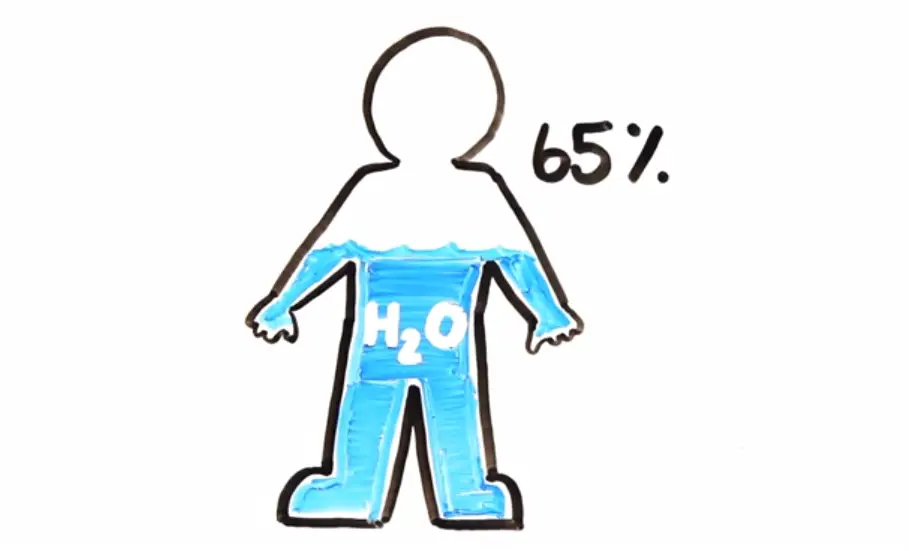
Abundant molecule
‘Abundant’ is used to describe something existing or available in large quantities; ‘molecules’ are a group of atoms bonded together, representing the smallest fundamental unit of a chemical compound that can take part in a chemical reaction. Therefore, this means that these molecules are plentiful.
Universal solvent
A ‘solvent’ is something that is able to dissolve other substances. Water is capable of dissolving a variety of different substances, which is why it is such a good solvent. And, water is called the “universal solvent” because it dissolves more substances than any other liquid.
[Tweet “Nutrients A nutrient is a substance that provides nourishment essential for the maintenance of life and for growth”]
Nutrients
A nutrient is a substance that provides nourishment essential for the maintenance of life and for growth.
Cushions
(Verb) To soften the effect of an impact on something, or mitigate the adverse effects of something. (Noun) a bag of cloth stuffed with a mass of soft material, used as a comfortable support for sitting or leaning on; something providing support or protection against impact.
Lubricates
When a substance is applied so as to minimize friction and allow smooth movement.
Urine
A watery, typically yellowish fluid stored in the bladder and discharged through the urethra. It is one of the body’s chief means of eliminating excess water and salt, and also contains nitrogen compounds such as urea and other waste substances removed from the blood by the kidney.
Sweating
Moisture exuded through the pores of the skin typically in profuse quantities as a reaction to heat, physical exertion, fever or fear.
[Tweet “Pooping An informal term used for excreting, when one goes to the toilet to relieve their bowels and discharge faeces from the body.”]
Pooping
An informal term used for excreting, when one goes to the toilet to relieve their bowels and discharge faeces from the body.
Essential
Something that is absolutely necessary; extremely important.
Blood vessels
These can be defined as tubular structures carrying blood through the tissues and organs; a vein, artery, or capillary.
Substances
This could be any particular kind of matter with uniform properties.
Signs of dehydration
A person can become dehydrated if they lose too much fluid, don’t drink enough water or fluids, or both. The signs are what happens as your body reacts to dehydration.
[Tweet “Odor (‘Odour’ in BrE) – a distinctive smell, especially an unpleasant one.”]
Odor
(‘Odour’ in BrE) – a distinctive smell, especially an unpleasant one.
Light-headed
When a person begins to feel dizzy and slightly faint.
Read more:
How to use the verb WISH?
Your brain tissue literally shrinks
The brain is the soft convoluted mass of nervous tissue within human skulls that is the controlling and coordinating centre of the nervous system and the seat of thought, memory, and emotion. The word ‘literally’ is used to describe when something happens in a literal manner or sense; exactly. So, in other words, this phrase means that the human brain actually shrinks when one’s body is dehydrated.
Hydrated
The opposite of dehydrated; when someone or something is caused to absorb water, they are hydrated.
Peeing
An informal slang term used for the verb ‘urinate’.
[Tweet “Have trouble swallowing This phrase means that it would be difficult for something (especially food or drink) to pass down the throat.”]
Have trouble swallowing
This phrase means that it would be difficult for something (especially food or drink) to pass down the throat.
Suffer from muscle spasms
Muscle spasm is an involuntary contraction of a muscle that can cause a great deal of pain.
Likely experience nausea
The word ‘likely’ defines as ‘such as well might happen or be true’; probable. ‘To experience nausea’ is when one feels sickness at the stomach, especially when accompanied by a dislike for food and an involuntary impulse to vomit.
Attention to digestion
This refers to the action of dealing with or taking special care of the process of what your body digests or takes in through the mouth.
Delirious
In an acutely disturbed state of mind characterized by restlessness, illusions, and incoherence; affected by delirium.
[Tweet “Impaired Having a disability of a specified kind (in this case brain function). When something is not working properly, as it should.”]
Impaired
Having a disability of a specified kind (in this case brain function). When something is not working properly, as it should.
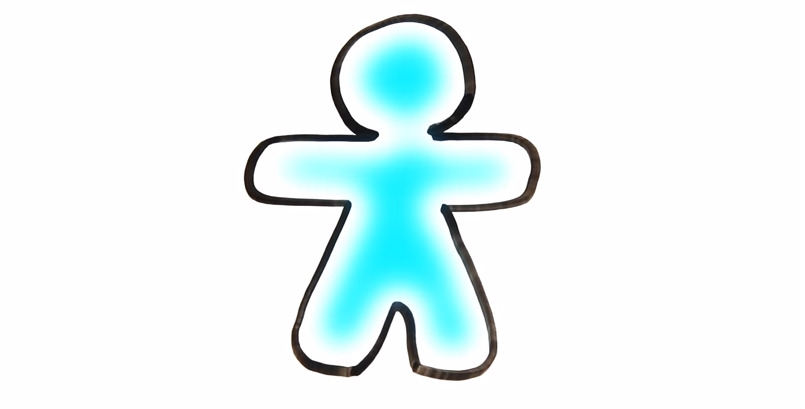
Core body temperature
The temperature at which vital organs (i.e. brain, heart) are maintained.
Grey-blueish tinge
The word ‘tinge’ means a light trace of a colour, so this describes a pale mixture of grey and blue.
Aquifers
A body of permeable rock which can contain or transmit groundwater.
Used to grow crops
Crops are plants or products that are grown and harvested by farmers.
Electric power plants
‘Power plant’ is another term for ‘power station’, which is an engine or other apparatus that provides power for a machine, building or something larger.
Contaminated
When something has been made impure by exposure to or addition of a poisonous, polluting or harmful substance.
[Tweet “Innovative (of a product or idea) featuring new methods; advanced and original”]
Innovative
(of a product or idea) featuring new methods; advanced and original.
Pure
Not mixed or adulterated with any other substance or material.
Water charities
A charity is an organisation set up to provide help and raise money for those in need. Many charities are specific to certain people or areas of need, in this case supporting people or communities with problems such as water shortages or lack of clean drinking water.
Hope you enjoyed this lesson about Water! Will you use the highlighted words?
Read more:
280 Basic English Words You Should Know



